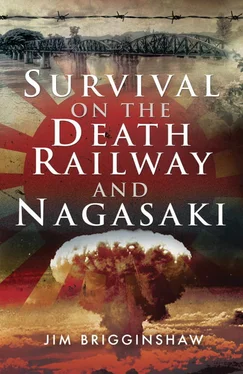About three thousand Australian troops from the 2/26, 2/29 and 2/30 battalions were herded into the Singapore padang for the surrender. Armed Japanese milled about, seemingly doing their best to appear friendly. They walked among the captives, smiling and nodding to them.
‘Get onto this bloke’, Sol Heffernan nudged. A short rotund Japanese soldier had brought a mouth-organ out of his pocket. ‘I think he’s going to give us a concert.’
The Japanese man started playing, not some patriotic song of Nippon, but Auld Lang Syne.
The men were hushed as the strains of the sentimental ballad reminded them of home and their families.
It was a friendly enough scene for Sol to make a remark that was soon to prove to be a badly misplaced piece of optimism. ‘Doesn’t look as if we’re going to was soon have much trouble getting on with this mob.’
On the fifteen-mile march to Changi, when he received a rifle butt in the ribs for his dropkick at the worthless money, he admitted he could be wrong.
By the time the weakened men reached Changi, they were exhausted and showing the effects of the beatings they’d received along the way.
Changi Prison’s main buildings were concrete, three storeys high, and had been badly damaged by aerial bombing and shellfire. Beneath one of the buildings lay an unexploded five-hundred-pound bomb.
When the Australians arrived at the jail, the civilian prisoners it housed were moved into what had been the barracks of the Scottish regiment, the Gordon Highlanders, before Singapore fell.
The prison had no barricades, so the Japanese ordered the men to make it secure. Around the perimeter, they were forced to build three rows of triple dannett, a circular tunnel of barbed wire. Two of the rows were side by side, and the third was on top of them. Alongside this was a row of double apron-four strands of barbed wire close together with an apron down each side. For extra security, another three rows of triple dannett were added.
Sol made another incorrect observation when the barricades were finished. ‘A man’d have to be a bloody snake to get through this.’
It wasn’t long before the wire was being breached at night, not by snakes, but by desperately hungry prisoners. The daily ration was just a handful of rice and an Indian army biscuit with a small piece of cheese or sardine on it. Some of the rice had been sprinkled with lime to combat weevils and when cooked, it turned yellowish-green and had a vile taste.
Despite this meagre diet, the weakened prisoners were forced to do heavy work outside the compound, mainly unloading ships in Singapore harbour and cutting wood for the cooking fires.
Nobody tried to avoid the harbour work because it provided a chance to scrounge a few grains of rice or a tin of jam or milk from the ships’ crews. Anything they were given had to be smuggled back into the prison. If they were caught, it meant a bashing or worse from the Japanese guards.
Grisly sights were common for the work parties. One group was given the job of burying the decaying Chinese corpses that were strewn along a Changi beach. They’d been marched into the water and machine-gunned. The Japanese had expected the tide would carry the bodies out to sea, but instead it had pushed them up onto the sand.
Machine-gunning in the water was an execution method the Japanese were to use later on Australian nurses in Sumatra.
Another work party on clean-up duty found a tarpaulin-covered pile from which came the putrid smell of rotting flesh. When the guards used their rifle butts to keep them away from seeing what the pile contained, the men feared it was more bodies.
One prisoner managed to get close enough to sneak a look under the tarpaulin. He saw dozens of corpses in an advanced stage of decomposition. However, these were not Allied bodies; they all wore the navy blue uniform of the Japanese Imperial Guard, a crack division operating in the Malayan campaign. The bodies were apparently awaiting cremation, the Japanese way of disposing of their dead.
Instead of grieving over another atrocity, the prisoners were relieved to find that this time, the death pile was the enemy.
With many thousands of Changi prisoners confined to an area about the size of an average town shopping block, there was always the danger of an outbreak of disease. Latrines were carefully constructed, and all waste was sedulously disposed of to guard against germ-carrying flies. Hundreds of deep holes were dug to cater for the large number of men, and they were constantly being filled in and new ones dug.
Time was filled in at night with the ‘group natter’, a prisoners’ talkfest wherein the main topics were food and how long it would take the Allies to turn the tide of the war and release them from captivity. Some estimated it would be all over in a few weeks, a few months at the most. Most, though, thought it would take at least a year.
Jim Bodero was pessimistic. He knew the task was formidable. In Europe and the Pacific, Germany and Japan had swept all before them, and it would take a supreme effort to halt the momentum, let alone turn the tide. He predicted to the group that ‘By the time this stoush is over, those of us who are still around will be much older, and we’ll have changed so much we’ll be hard to recognise.’
Using a stub of pencil and a scrap of paper, in April 1942 he wrote a verse on the outcome of the war. He was to carry it with him for three and a half years.
We’d won, and everywhere the flags were flying
Proudly, gaily fluttering in the breeze,
Pennants brave of many different colours,
Commemorating famous victories.
The cities’ streets were thronged with people
To welcome home their heroes from the war,
Triumphal arches, streamers and confetti,
As they had some twenty years before,
And as they will some twenty years later.
For man’s a creature strange, without much wit,
And each great war becomes a little greater
Than the great war previous to it.
They marched in threes past the civic building,
Where midst a mass of braid and medals bright
His Ex, the governor-general of Australia,
Erect and proud, awaited the ‘eyes right’.
Accompanied by strains of martial music
Marched to shouts and cheers, ‘Six’ and ‘Seven’
Then came the Eighth…
His Ex’s eyebrows twitched towards the heavens,
‘I will admit,’ he said to those about him,
‘Times have changed tremendously of late,
But of one thing I really am most certain,
There’s more than that belong to Number Eight.’
The Chief of Staff agreed with this assertion,
And from a group of laurel wreaths and crowns
Called his trusted deputy towards him
To probe the pros and cons and ups and downs.
The deputy was really most resourceful,
His deputy he sent for interview,
And so on till they found within the army
A deputising deputy who knew.
He hastened to report upon the matter,
That insomuch as far as he could say,
According to the latest information,
The missing men had not yet left Malay.
He’d written airmail on the 13th instant
Informing them the armistice was signed,
With instructions to report back to Australia
Just as soon as everyone had felt inclined.
Just then there came a noise of much excitement
And people moving down towards the shore,
For queer boats of many shapes and sizes
Were quietly floating inward by the score.
Soon they beached, and climbing from the sampans,
For such these craft had since turned out to be,
There came a motley crowd of human beings
Like bits of jetsam cast up by the sea.
Silently the crowd gave way before them
As they staggered out on to the beach,
Never was there beheld such a procession,
Or ever seen a shambles so complete.
Hair long and black, beards thick and flowing,
And teeth stained from the juice of betel nut,
Bodies clad in sarongs, towels and loincloths,
And faces browned and scarred with parang cuts.
Some led goats or monkeys there behind them,
And one rode on a water buffalo.
In the van were many brown-skinned children,
But who were whose no one seemed to know.
Still they struggled, staggering ever onwards,
Till at last no further could they go,
Exhausted, swooning, sank to earth there dying,
With a last despairing ‘Ullo, Joe.’
They buried them midst peaceful scenes familiar,
Where all is still, save when the evening breeze
Is softly heard sometimes when gently stirring
Midst the coconut and rubber trees.
Читать дальше












